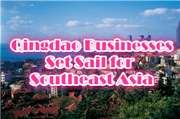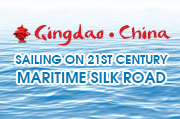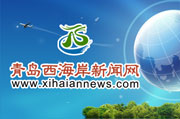Qingdao: A new leap for the "brand city"
Updated: 2010-03-17
|
|||||||||
Qingdao, a city of brand names, boasts many well-known products and its efforts to build up brand popularity have helped boost the city's competitiveness, economy and development potential.
Qingdao is one of the many cities in China that use major brand-name corporations to boost their economies. Some famous brands that do business in the city include Haier, Hisense, Tsingtao Beer, Double Star and Qingdao Harbor.
Qingdao now has 68 of China's Famous Trade Names, 53 brand name products at a national level, 322 at a provincial level and 401 at a local level. Five companies in Qingdao have won the National Quality Management Award.
Among them, Haier and Tsingtao Beer are the two leading companies to expand their brand presence around the world.
According to Qingdao Development and Reform Commission, Qingdao will speed up the brand strategy and encourage people to create local brands. Qingdao plans to have three world-famous brands, 80 China-famous brand products, 300 Shandong-famous brand products, 30 National well-known trademarks and 300 Shandong well-known trademarks by 2010.
In 2009, 45% of businesses in Qingdao had their own famous brands. Thus, Qingdao has become a "brand city" with its brand products and brand economy.
Recently, the focus of Qingdao's famous brands has been making a transition from modern equipment manufacturing to the modern service industry. The “high-speed 259km/h motor train unit” finished by Qingdao’s famous Sifang Locomotive and Coach Wagon Corporation was awarded the prestigious National Science and Technology Progress prize. A motor train unit with a maximum speed of 350km/h is still in production.
"Qingdao is breeding brands of modern equipment and high technology," said Wu Jingjian, vice-mayor of Qingdao.
The brand of high-speed motor train units will form a new industrial chain, which will become the manufacturing base for China’s world-famous motor trains.
Qingdao is the wealthiest city in Shandong province, which has the second-highest GDP of all Chinese provinces. Despite its position on the Yellow Sea along the outer edge of the Shandong Peninsula, Qingdao is included with its neighbors on the other side of the peninsula as part of the Bohai Sea Rim economic zone, North China's answer to the Pearl River Delta (PRD) and the Yangtze River Delta (YRD) regions.
In November last year, Qingdao was awarded the title of “The Famous Brand City of China” at the 2005 China Brand Economy and City Summit held in Beijing.
But the undisputed king of Qingdao's native companies is home appliance giant Haier, whose global revenue in 2005 was nearly US$13 billion, about 38.5 per cent of its hometown's entire GDP. The company, which sprang from the ashes of a deteriorating state-run factory in 1985, is now the world's second-largest maker of refrigerators and is diversifying into such areas as mobile phones, insurance and pharmaceuticals.
On January 31, 2004, Haier became the only Chinese company to be named one of the World's 100 Most Recognizable Brands in a global name brand list edited by the World Brand Laboratory, one of five world brand evaluation organizations.
Its brand value tops the domestic companies and is worth 61.237 billion yuan (US$76.55 billion).
Brand Strategy
The success of brand development is due to the Brand Strategy, which was put forward in the mid-1980s.
The city has continuing following the strategy ever since, and a number of companies have emerged and established their status as household names throughout the nation.
Aside from Tsingtao and Haier, there are also high-tech firms like Hisense, which accomplished a breakthrough for Chinese companies when it developed its own digital video media processor technology in 2005.
Far from being single-mindedly focused on nurturing its own companies, Qingdao has also received a lot of attention from international firms, which have invested billions of yuan in the city through its projects there.
Besides electronics and appliances, other key industries in Qingdao include clothing and the food and beverage sectors—Nike and Coca-Cola also have multiple plants in town. Qingdao has especially close ties with Korean businesses. There are over 5,000 Korean companies in Qingdao and about 60,000 Koreans live there.
Thanks to a clean and favorable investment environment, about 80 brands from World Top 500 companies like Samsung, HP, Lucent, Hyundai, Panasonic, Nescafe, and Wal-Mart have moved to Qingdao in recent years and are joined by top domestic brands like Gome, Sanlian and The Home World.
Famous brand names in Qingdao do business in areas as varied as electronics, home appliances, chemical engineering, rubber production, beverages, food, costumes, steel, vehicles, containers and ship-building.
As a coastal city, the shipping industry, tourism and ocean economy have made giant strides.
Of the Bohai Rim cities, Qingdao is the most accessible to international sea routes and is especially convenient to Japan and Korea, an advantage that has helped Qingdao's port in the Huangdao District compete with its rival in Tianjin.
According to Mayor Xia, at least 20 million tourists from around the world choose Qingdao as their destination each year.
Hosting sailing and several other water-sport events before and during the 2008 Summer Olympics will of course provide a big boost for Qingdao's international profile—it will be the only Chinese city other than Beijing to host a medal round in any sport.




